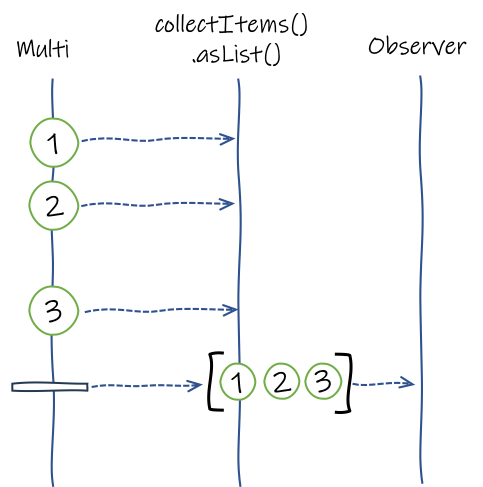There are cases where you want to accumulate the items from a Multi and produce a Uni as a final result.
This is also called a reduction in functional programming.
The Uni fires its item when the Multi completes.
Mutiny provides multiple operators to deal with that scenario.
For example, you can store the items in a list, emit the list on completion, or use a Java Collector to customize the aggregation.
| Don’t collect items from infinite streams or you will likely end with an out-of-memory failure! |
Collecting items into a list
One of the most common approaches to collect items is to store them in a list (Uni<List<T>>)
It emits the final list when the Multi completes.

How to achieve this with Mutiny?
Multi<String> multi = getMulti();
Uni<List<String>> uni = multi.collectItems().asList();It’s important to note that the returned type is a Uni.
It emits the list when the multi completes.
Collecting items into a map
You can also collect the items into a Map.
In this case, you need to provide a function to compute the key for each item:
Multi<String> multi = getMulti();
Uni<Map<String, String>> uni =
multi.collectItems()
.asMap(item -> getUniqueKeyForItem(item));If the key mapper function returns the same key for multiple items, the last one with that key is stored in the final Map.
You can collect items in a multimap to handle items with the same keys.
Collecting items into a multimap
A multimap is a Map<K, List<T>>.
In the case of a conflicting key, it stores all the items in a list associated with that key.
Multi<String> multi = getMulti();
Uni<Map<String, Collection<String>>> uni =
multi.collectItems()
.asMultiMap(item -> getKeyForItem(item));Using a custom accumulator
You can also use a custom accumulator function:
Multi<String> multi = getMulti();
Uni<MyCollection> uni = multi.collectItems()
.in(MyCollection::new, (col, item) -> col.add(item));The in method receives two arguments:
-
a supplier providing the new instance of your collection/container
-
the accumulator function
You can also use a Java Collector.
For example, in the next example, count the number of items, and produce the final count as item:
Uni<Long> count = multi.collectItems()
.with(Collectors.counting());